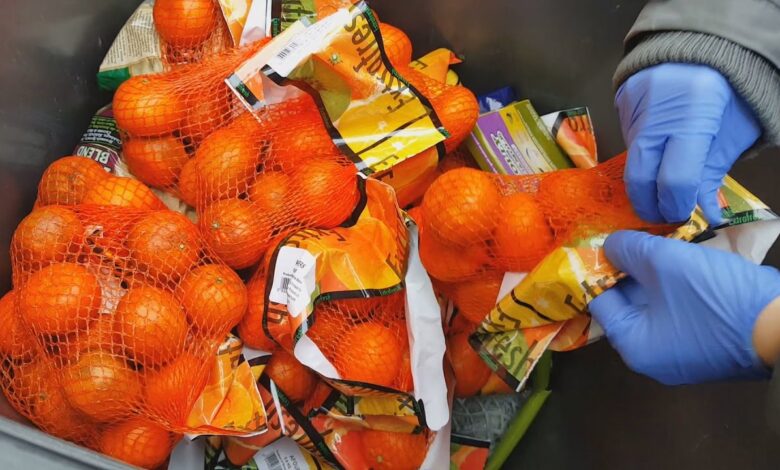Reducing Food Waste, an economic, environmental, ethical imperative

The Times Kuwait Report
Since 2019 the world has been observing the International Day of Awareness of Food Loss and Waste each year on 29 September. The day aims to raise awareness on food loss and waste, and to encourage initiatives to reduce it. However, the latest report from the United Nations Environment Programme (UNEP) that tracks food wastage at the consumer level, shows that achieving the UN Sustainable Development Goal 12, which calls, among others, for halving per capita food waste by 2030, is still a long way off..
With only six years remaining to realize the target of halving food waste and loss, it is evident that the world needs to accelerate the pace of implementing policies to achieve this objective. But the latest UNEP Food Waste Index Report 2024 (FWIR-2024) notes that in 2022 the world wasted 1.05 billion tonnes of food at the retail, food service, and household level, an increase of over 11 percent from the 931 million tonnes reported in FWIR-2021.
The report reveals that approximately one-fifth (19%) of total food available for consumption ended up being wasted in 2022. To put this figure in perspective, it is the equivalent of buying five bags full of groceries at the local supermarket and then tossing one bag in the trash bin on the way home. Additionally, food waste at the consumer level combined with a food loss at the post-harvest stage, of around 13 percent of global food production, amounted to nearly one-third of all food produced around the world being wasted or lost.
Food loss and waste undermines the sustainability of global food systems, and reducing this wastage is an economical, environmental, and ethical imperative of people everywhere. As the UNEP report notes in its executive summary, food waste is a market failure that results in the throwing away of more than US$1 trillion worth of food every year. It is also an environmental failure as food waste generates an estimated 8–10 percent of global greenhouse gas emissions and takes up the equivalent of nearly 30 percent of the world’s agricultural land.
Food waste is also a failure at the people level. Out of the total food wasted in 2022, households accounted for the largest share, at 60 percent or 631 million tonnes. Food service sector, which includes restaurants and catering services, wasted another 290 million tonnes, and 131 million tonnes were lost at the retail level. The ongoing food waste at the consumer level is all the more shocking considering the number of people around the world who go to bed hungry each night.
The UNEP report reveals that more than 780 million people worldwide are affected by hunger each year, and 150 million children under the age of five suffer stunted growth and development due to undernourishment. Despite this grim statistic on global hunger, data from the FWIR-2024 indicates that households worldwide wasted the equivalent of around one billion meals every single day — enough food to provide 1.3 meals daily to everyone impacted by hunger.
In Kuwait, food waste is a significant issue that has not been effectively addressed, mainly due to the low-priority accorded to this issue over the years. The latest UNEP report on food wastage notes that Kuwait generated around 99 kilograms of food waste per person in 2022. With a population of around 4.8 million people, the estimated 475,000 tonnes of food waste from households, food services and retail activities in 2022 was shockingly high.
Incidentally, the reported 99 kg per capita waste in Kuwait is not verified data; it is largely based on extrapolations from the few figures available on food wastage in the country. Accepting this limitation, the UNEP attributes only a ‘low-confidence’ to the data submitted by Kuwait. Measuring food waste accurately, and identifying the stage at which it occurs, is needed to fully comprehend the magnitude of the problem, and to design targeted mitigating measures, as well as to use the data as a baseline for tracking progress in reducing food waste.
Perhaps researchers at the Kuwait Institute for Scientific Research (KISR) or the Sociology Department at Kuwait University could spearhead a study to provide more accurate data on food waste in the country. In the meantime, increasing awareness programs, promoting sustainable lifestyles, and empowering younger generations are effective strategies that could be pursued to positively impact food waste in the country..
Stricter laws against food waste could also be contemplated, including one that requires retailers and food service providers to redistribute edible food to food banks and charities, or face heavy penalties. In this regard, it is praiseworthy that several civil society organizations in Kuwait have launched projects that help reduce food waste by collecting and redirecting quality food to those in need.
One such Kuwaiti venture is Refood, a non-profit social enterprise that collects good quality foods and consumer products that are nearing-expiration date from like-minded food, and fast-moving consumer goods companies. Refood then offers these products as a subscription service to homes with limited resources, enabling these families to access quality foods and consumer products that would otherwise end up in landfills.
Al-Issa Endowment, is another initiative by a team of volunteers who coordinate with one of Kuwait’s pioneering charity organizations, Kuwait Bank for Food and Relief, to collect cooked meals from restaurants, hotels, catering companies, and from social gatherings, to redistribute them to needy families. The volunteer team requests donors to contact them in advance of any event, so as to arrange for the speedy collection and efficient redistribution of foods.
Another non-profit initiative is Nemati, which collects good-quality food products nearing expiration date from retailers, or safe-to-consume surplus foods from hotels, restaurants, and catering companies, to create food-baskets holding various foods, which are then offered to those in need at a nominal price. In addition, many food companies and cooperative societies donate surplus food on their shelves to food charities on a regular basis as part of their social responsibility.
However, these initiatives cannot be expected to realistically address the enormity of the food waste problem in the country. Food waste is a complex challenge with many factors contributing to the situation, and involves multiple stakeholders at the food production, processing, distribution, consumption and disposal stages. This multiplicity of actors means different strategies and collaborations are needed to tackle the issue comprehensively and effectively at each stage.
One approach proposed by the UNEP, which could help drive food waste reduction across the entire food supply chain, is through public-private-partnerships (PPP). This model would involve multiple stakeholders working together with the shared goal of tackling food loss and waste at various stages of the food system. Interestingly, a similar proposal to address food waste was recently submitted by the charity, Kuwait Bank for Food and Relief.
Vice-chairman of the Bank, Meshal Al-Ansari, is quoted as saying that the bank had submitted a proposal to establish a factory that collects and recycles surplus food into useful chemical fertilizers and animal feed. The proposal is apparently still awaiting response from the concerned entities. The Bank’s proposal definitely merits consideration, and could potentially be expanded to form a more elaborate PPP initiative that tackles food waste and loss at each stage of its occurrence.
For a country that faces food security challenges due to various factors, the slow response by relevant authorities in effectively addressing food waste and loss, both comprehensively and promptly, is inexplicable and in the long-run this could prove detrimental to the sustainable development of the nation.












